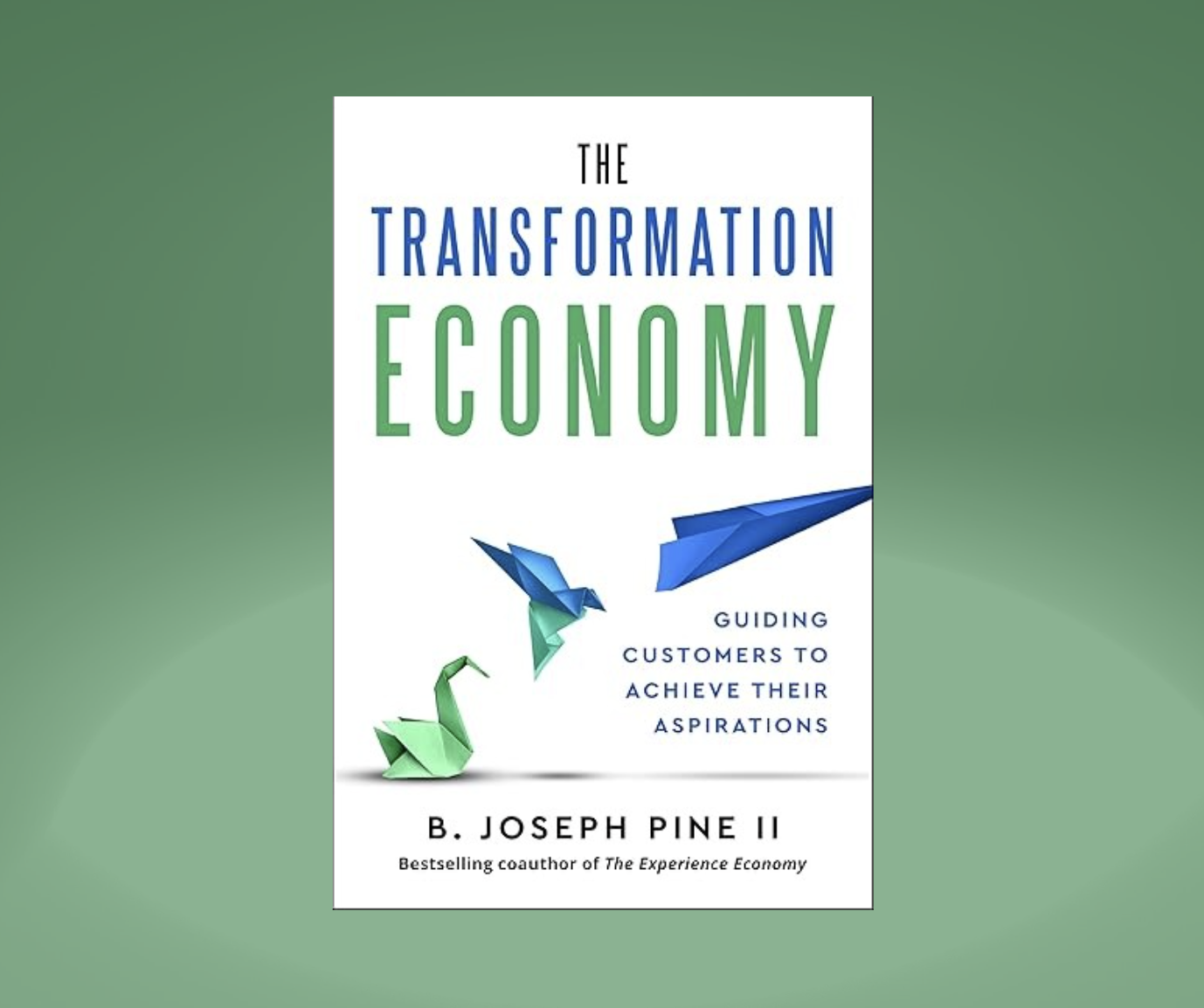Stone Mantel Experience Strategy Blog
The Transformation Economy Is Here: What Three Years of Research Reveals About Helping People Change
While half of people consider themselves capable of transforming their lives on their own, transformation action is often limited by a lack of empowerment—specifically, ability, willpower, and capacity. This gap between confidence and capability reveals a critical opportunity for companies willing to meet people where they truly are.
Differentiation is Hard; A Point of View Makes All the Difference
Sameness. That is and will be the most important problem of the Intelligent Era. I am more convinced than ever that we will be inundated with goods, services, and experiences that are basically the same. And the reason is simple: with AI, the cost of building new solutions will go down, but the solutions that are built with AI will almost always be middle-of-the-road solutions. Companies will build quickly—because they must—but they will basically offer the same thing that their competitors offer.
Are Cracker Barrel's Woes About Logo Redesign or Something Else?
Cracker Barrel is all over the news today. So I thought I would join in. For our global audience, a little background. If there was one restaurant chain that represented Southern cooking and old-time local fare in the U.S., it’s Cracker Barrel. That Cracker Barrel was actually a national chain was beside the point. Because of the way it was themed, the store/restaurant was an institution and an homage to the timelessness of small Southern towns.
Giving Experience Strategists Superpowers
We at Stone Mantel take our strategic thinking seriously. And those of you who have followed this Substack know that I’ve argued that corporate business models must change. The way we see markets, measurement, customer needs, and resources must change. They must become more focused on the near future needs of people and less focused on what traditional consultancies call ‘customer experience.’
The Future is Uncertain, And Bright for Those With a Point of View
If I come across one more article quoting Bill Gates and Anthropic CEO Dario Amodei telling me that there are going to be mass layoffs of white-collar workers, I’m going to blow gasket! (Here’s another and the gasket is blown.) These very intelligent people see no prospects for other intelligent people.
But I do.
America Looks to Europe to Reinvigorate Retail Spaces
A recent article in the Wall Street Journal reminds us of the net impact of the metrics used by retailers over the last 20 years: no functional department stores. Kate King, a reporter for the WSJ wrote an excellent piece about Printemps, the French department store. Printemps has opened its first store in New York City. And unlike its American competitors, the department store has not focused on sales per square feet.
Expand Your Meaningful Experiences Toolkit to Create Time Value
I know you think you understand how value is created from experiences, but I wonder if you really do. As I’ve mentioned in previous posts on value creation, real, lasting value comes through understanding what is time well saved, time well spent, and time well invested. In this post, I hope you will find useful ideas on how to increase the value of the time customers spend with you through ‘meaningful elements’ like authenticity and ‘little things.’
The TWS Metric: How to Measure Meaningful Experiences
It’s obvious that what you measure will be what you design for. Even while we are transitioning to a world of intelligent experiences, there’s still much that needs to be done to evaluate the experiences that customers have. And sometimes the best way improve the experience is to ask better questions.
How a B2C Travel Brand Reinvented Itself Through The Collaboratives
When Heather Morse joined Stone Mantel’s Experience Strategy and Innovation Program, The Collaboratives, she was focused on building a B2C travel company. Two years later, her business model has completely transformed—and she credits that shift to the insight, structure, and inspiration she gained from Stone Mantel’s frameworks, the research, and the community.
The Promise of AI is Superpowers
Our research team at Stone Mantel has been asking people for eight years now what they want from AI. (Actually, we don’t ask the question exactly like that because if you do all you will get is ‘faster, easier, simpler’ answers.) A better way of saying it is that we’ve been exploring with people what their near future needs are and how intelligent solutions can help them. And the promise that AI makes is that people will gain superpowers.
The Intelligent Era and the Value of Time
The more sophisticated technology becomes, the more value that people place on their time. Think about that for second. It’s true. With each new generation of tools, people have changed the way they live their lives. Activities—like going to the bank—that were once routines become a hassle.
A Life System is Not a Journey
Companies have become accustomed to thinking about their customers’ experience with their solution as a journey. A journey is one way of seeing how the customer experiences things. It’s a linear way of describing the sequence of events that are most likely to occur. There is nothing wrong with journey mapping. It’s a powerful way to think about the impact your business model has on the customer. But it’s only one lens.
The Role of People in a Highly Intelligent, Highly Customized World
The bank tellers felt it. So did the airline check in agents of yesteryear. As smarter technology advances, certain jobs are put in jeopardy. And by now, most knowledge workers—people who are hired for the expertise and acumen—are starting to realize how quickly generative AI can learn their professions and provide a qualitative alternative to their services.
What is A Buying Mode & How Do You Support it?
Brands spend considerable time and money building purchase experiences for customers. But most of these experiences do not support the customers’ situations (or the contextual requirements that accompany the wide variety of settings where buying is possible). So, buying a milkshake in the morning could be a very different experience for the customer than buying a milkshake after dinner. Situations are what drive so much purchasing. To support customer situations, focus your purchase experience strategy on modes.
Thriving in Uncertainty
Experience strategists spend far too much time designing for the ideal and the permanent—when neither is real. In this webinar, my friend Brian Briskey and I will share two skills that all strategists should have: situational market analysis and scenario planning. You need these skills so you can help your company respond to the ever changing world, market forces, and customer needs. Stop designing for the ideal and the permanent! Start thinking about future scenarios and markets!
Qualtrics X4 Summit Proves We Got It Right
Qualtrics X4 Summit finished last week and one of the most exciting things introduced were ‘experience agents’. Zig Serfin, CEO of Qualtrics, made the announcement about Qualtric’s new AI features that understand context, preferences, and journey touchpoints—and that can take action in real-time on concerns that people have. Bravo! Well done Qualtrics. This is exactly what experience management needs, and, if I may, exactly what I described in 2017 in The Collaboratives as the future of channel strategy.
2025 Trends Webinar: Shaping Tomorrow's Experience Landscape
For twenty years Stone Mantel has been the home of forward looking insights into experience strategy. As we pondered twenty years of insights, our crack team of experience strategists have honed in on four trends that will create value for your company. Listen to our most recent webinar about technology, engagement, transformations, and tools that will shape experiences of tomorrow.
Expand Your Meaningful Experiences Toolkit to Create Time Value
Real, lasting value comes through understanding what is time well saved, time well spent, and time well invested. In this post, I hope you will find useful ideas on how to increase the value of the time customers spend with you through ‘meaningful elements’ like authenticity and ‘little things.’
Creating Business Value Through Modes
Modes signal context. Context is how intelligent solutions know what to customize. Say, for example, a person decides to watch a movie. They choose it from their queue. That choice signals to the software several potential modes the person is likely to be in. They are also providing clues about their context: watching a movie might mean they are relaxing or have dimmed the lights or would appreciate more robust surround sound. When customers are in modes, they want their tools to pick up those clues and adjust accordingly.
Life Systems Help People Create Balance
If you were to ask a customer 25 years ago what makes an experience meaningful, they would likely reply by saying things like ‘they remembered my name’ or ‘they upgraded my experience.’ But when we asked that question today, what people describe is very different. This post focuses on how people create systems for their life, how those systems create balance, and what the implications are experience design.





















